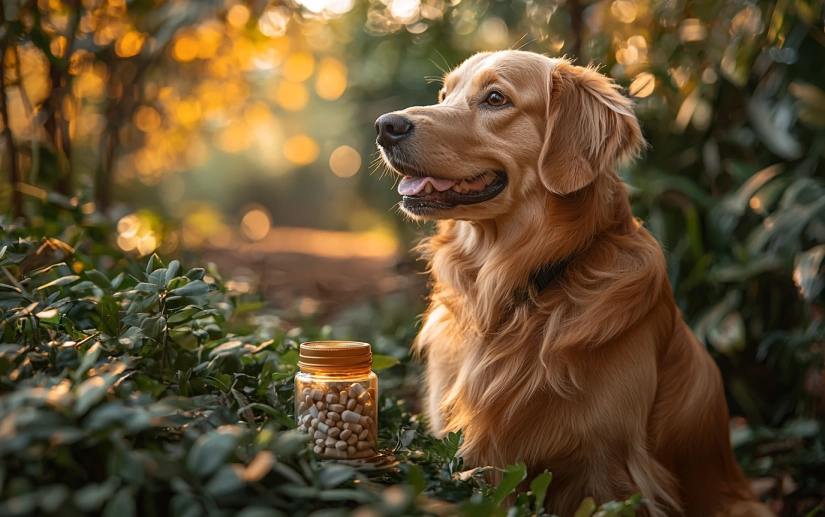Why Vitamins Are Important for Your Dog’s Health
Just like humans, dogs need a variety of vitamins to stay in peak condition. A well-rounded diet typically provides the essential nutrients, but certain life stages, health conditions, or even breed-specific needs can warrant the use of supplements. Vitamins help with everything from energy production and cell maintenance to immune system support and healthy development.
For example, older dogs may need more support for joint health, while puppies might need extra nutrients for growth. If a dog’s diet lacks variety or they suffer from specific health issues, vitamin supplements may be necessary to ensure they’re getting everything they need. Understanding which vitamins are essential and why can help you provide the best care for your dog, ensuring they live a long, happy life.
Key Essential Vitamins for Dogs

When it comes to dog vitamins, some stand out as particularly important for overall health. Let’s break down the key vitamins your dog needs and how they support their well-being:
Vitamin A: Eye and Skin Health
Vitamin A is a fat-soluble vitamin that plays a key role in maintaining healthy vision, skin, and immune function. It’s especially important for puppies as it supports growth and development. A deficiency in vitamin A can lead to poor vision, dry skin, and a weakened immune system.
You’ll often find vitamin A in dog foods, but if your pup is on a restrictive diet or has specific health needs, a supplement may be necessary.
B Vitamins: Energy and Brain Function
The B vitamins are a group of water-soluble vitamins that are crucial for energy production and maintaining a healthy nervous system. Each B vitamin serves a slightly different function, but together, they help your dog’s body convert food into energy, support brain function, and promote overall vitality.
- Vitamin B1 (Thiamine): Helps with carbohydrate metabolism and proper nerve function.
- Vitamin B2 (Riboflavin): Supports energy production and a healthy coat.
- Vitamin B6 (Pyridoxine): Important for brain development and immune function.
- Vitamin B12: Essential for red blood cell formation and nervous system health.
Dogs who are lethargic or have issues with their skin and coat may benefit from a B vitamin supplement.
Vitamin C: Immune Support
Vitamin C is a powerful antioxidant that helps neutralize free radicals in the body. While dogs can synthesize vitamin C on their own, supplementation may still be beneficial in certain situations, such as during illness or high stress. It supports the immune system, promotes healthy skin, and aids in the absorption of iron.
Giving your dog vitamin C can be especially helpful for older dogs, as it may support cognitive function and reduce inflammation in joints.
Vitamin D: Bone Strength
Vitamin D is essential for calcium absorption, which is critical for maintaining strong bones and teeth. Dogs that do not get enough vitamin D can develop rickets or other bone disorders. It also plays a role in nerve and muscle function.
Most dogs get their vitamin D through exposure to sunlight and their diet, but those on restricted diets or with specific health issues may require supplements.
Vitamin E: Antioxidant Power
Vitamin E is another antioxidant that helps protect cells from damage caused by free radicals. It supports skin and coat health, immune function, and healthy eyes. It’s also essential for fat metabolism and cellular function.
Dogs with skin conditions, poor coats, or those that suffer from allergies might benefit from an additional source of vitamin E.
Vitamin K: Blood Clotting
Vitamin K is crucial for blood clotting and helps prevent excessive bleeding if your dog gets injured. It also supports bone health and liver function. Deficiencies in vitamin K can result in excessive bleeding or bruising.
Most commercial dog foods contain sufficient vitamin K, but it can also be supplemented if needed, especially if your dog is on certain medications or has digestive issues.
Signs Your Dog Might Need Vitamin Supplements

It can sometimes be challenging to determine whether your dog is getting enough vitamins from their diet alone. Here are some signs that might indicate a need for supplementation:
- Lethargy or low energy: If your dog seems unusually tired or sluggish, they may need more B vitamins or iron.
- Poor skin and coat condition: Dull fur, excessive shedding, or dry, flaky skin may signal a lack of vitamin A, E, or B vitamins.
- Weakness or limping: Joint or bone problems could be a sign your dog needs more vitamin D or C to support bone strength and collagen production.
- Slow wound healing: Vitamin K deficiencies may lead to prolonged bleeding and slow healing of cuts or injuries.
- Frequent infections: A weak immune system might indicate your dog isn’t getting enough antioxidants, like vitamins C and E.
If you notice any of these signs, it’s always best to consult with your veterinarian before starting your dog on any new vitamin supplement.
READ ALSO: Is Your Dog Sick? Signs of Dog Illness You Should Never Ignore
Choosing the Right Vitamins for Your Dog
With so many dog vitamins on the market, it can be overwhelming to choose the right one for your pet. The key is to look for high-quality, veterinarian-approved supplements that meet your dog’s specific needs. Here are some tips for making the best choice:
- Consult Your Veterinarian: Always consult your vet before introducing new supplements into your dog’s diet. They can guide you based on your dog’s age, breed, size, and health condition.
- Check the Ingredients: Look for products with natural ingredients and avoid unnecessary additives, fillers, or artificial preservatives. Choose brands that are transparent about their ingredients and sourcing.
- Look for Specific Formulas: Some supplements are tailored to specific needs, such as joint support, skin and coat health, or immune function. Make sure the product addresses your dog’s individual health concerns.
- Choose Reputable Brands: Opt for trusted brands that are recommended by veterinarians and pet owners. Look for certifications or third-party testing to ensure the supplement is safe and effective.
How to Safely Introduce Vitamins into Your Dog’s Diet
When introducing vitamins to your dog’s diet, start slow. Here’s a step-by-step guide to ensure the process is smooth and safe:
- Start with a Low Dose: Begin with a lower dose than the package recommends to see how your dog reacts. Gradually increase the dosage based on your vet’s advice.
- Mix with Food: Some dogs may be picky about supplements, so try mixing the vitamins with their regular food. Soft chew supplements or liquid forms can make this process easier.
- Monitor for Reactions: Keep an eye on your dog for any adverse reactions, such as vomiting, diarrhea, or lethargy. If you notice any negative side effects, stop the supplement and consult your vet.
- Stick to the Recommended Dosage: Over-supplementing can cause more harm than good. Always follow the dosage guidelines provided by your veterinarian or the product manufacturer.
Top-Rated Essential Dog Vitamins on the Market
There are many high-quality dog vitamin supplements available today. Here are a few of the top-rated options for overall health:
- Nutri-Vet Multi-Vite Chewables: These daily multivitamins offer a blend of essential vitamins and minerals for dogs of all ages, promoting energy, immune health, and a shiny coat.
- Zesty Paws Multivitamin for Dogs: A popular choice among pet owners, Zesty Paws includes vitamins, minerals, and probiotics that support digestion, joints, and skin health.
- PetHonesty 10-for-1 Multivitamin: Known for its natural ingredients, this supplement covers 10 essential areas of health, from hip and joint support to heart and immune health.
Natural Sources of Vitamins in Dog Food
If you prefer to boost your dog’s vitamin intake naturally, many foods can help. Here are some excellent natural sources of essential vitamins:
- Carrots and sweet potatoes for vitamin A.
- Chicken and beef liver for B vitamins.
- Blueberries and citrus fruits for vitamin C.
- Egg yolks and fish for vitamin D.
- Spinach and leafy greens for vitamin K.
Incorporating these foods into your dog’s diet can help them get the nutrients they need without relying solely on supplements.
Common Myths About Dog Vitamins

With the growing popularity of pet supplements, there are several myths and misconceptions surrounding dog vitamins. Let’s clear up some of the most common ones:
Myth 1: All Dogs Need Vitamin Supplements
While vitamins are essential for health, not every dog requires additional supplements. If your dog is eating a balanced, high-quality commercial dog food, they may already be receiving the necessary nutrients. Supplementing without a true need can sometimes lead to vitamin overdoses, which can cause more harm than good. Always consult with your vet before adding vitamins to your dog’s diet.
Myth 2: Human Vitamins Are Safe for Dogs
Human vitamins are not formulated for dogs and can contain ingredients that are harmful to pets. For instance, some multivitamins for humans contain iron, which can be toxic to dogs in large amounts. Stick to pet-specific supplements that are tailored to your dog’s size, breed, and health requirements.
Myth 3: More Vitamins Equals Better Health
Giving your dog too many vitamins, especially fat-soluble ones like vitamins A, D, E, and K, can lead to toxicity. Over-supplementing can cause serious health problems, such as organ damage. It’s important to stick to the recommended dosage and never exceed what’s needed.
Conclusion: Keeping Your Dog Healthy with the Right Vitamins
Ensuring your dog gets the essential vitamins they need is one of the best ways to support their overall health. Whether through supplements or a carefully balanced diet, paying attention to your dog’s nutritional needs can help prevent health issues and ensure they live a long, happy life. Always consult your veterinarian when adding vitamins or supplements to your dog’s routine, and choose products that are high quality, safe, and suited to your dog’s specific needs.
By being proactive about your dog’s vitamin intake, you can make sure they thrive at every stage of life, from puppyhood to their golden years.





